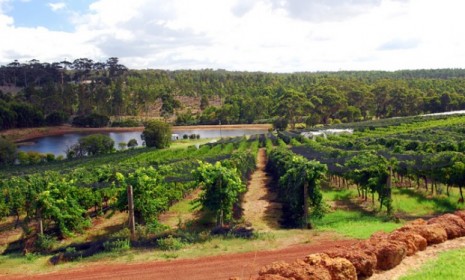How global warming is changing winemaking
Australian vintners are worried that climate change is affecting the flavors of their wines. But some oenophiles may actually toast the change

A free daily email with the biggest news stories of the day – and the best features from TheWeek.com
You are now subscribed
Your newsletter sign-up was successful
As global temperatures rise, the grapes in Australia's wine regions are ripening ever earlier, according to a new study in Nature Climate Change. That's a problem for vintners, says lead researcher Leanne Webb, because early ripening "often has undesirable impacts on wine quality." The earlier the grapes mature, the hotter the weather at the time of harvest, and "hot vintages are not good for quality wines," says co-author Snow Barlow. Here's what you should know:
How much is climate change affecting grape harvests?
On average, Australian wine grapes are ripening 20 days earlier than in 1985. But the results are varied. At one vineyard, grapes are maturing 34 days faster than they did in 1985, while another winery actually has its grapes maturing about half a day later. Warming temperatures account for about a third of the early-ripening effect, say researchers from the University of Melbourne and Australia's Commonwealth Scientific and Industrial Research Organization (CSIRO). Other factors include drier soil, changes in vine management, and smaller harvests.
The Week
Escape your echo chamber. Get the facts behind the news, plus analysis from multiple perspectives.

Sign up for The Week's Free Newsletters
From our morning news briefing to a weekly Good News Newsletter, get the best of The Week delivered directly to your inbox.
From our morning news briefing to a weekly Good News Newsletter, get the best of The Week delivered directly to your inbox.
Why is this bad?
Early ripening and "hotter" wines change the prized geological characteristics that produce distinctive regional wines — a concept winemakers call "terroir." Grapes that mature earlier and in warmer weather have more sugar, which makes for either sweeter wines or wines with higher alcohol content — derogatorily called "fruit bombs."
Is everyone convinced this is bad news?
No. In survey after survey, "wine drinkers say that they want lower-alcohol wines," says Felix Salmon at Reuters. But when people "actually taste the stuff, in general the higher the alcohol the happier they are. Especially when the wine is expensive."
A free daily email with the biggest news stories of the day – and the best features from TheWeek.com
What can grape growers do to combat climate change?
They can't change the weather, but "soil moisture and the yield are both areas where the grape growers can have some control," says Penny Whetton of CSIRO. They can irrigate more, conserve ground moisture by mulching, and pick more resistant root stock. Or they can roll with it, says Reuters' Salmon. In California, higher-end wineries are producing sweeter grapes not because of climate change, but because more intense wines are what critics increasingly like — and what wine drinkers will pay more for. The only sure thing, says Catherine Rabb in the Charlotte Observer, is that if you "want wine lovers to get up in arms," you'll mention wine's rising alcohol content — and watch the tipplers duke it out.
Sources: ABC News, Adelaide Advertiser, AFP, Charlotte Observer, Conversation, Reuters
-
 Trump wants a weaker dollar but economists aren’t so sure
Trump wants a weaker dollar but economists aren’t so sureTalking Points A weaker dollar can make imports more expensive but also boost gold
-
 Political cartoons for February 3
Political cartoons for February 3Cartoons Tuesday’s political cartoons include empty seats, the worst of the worst of bunnies, and more
-
 Trump’s Kennedy Center closure plan draws ire
Trump’s Kennedy Center closure plan draws ireSpeed Read Trump said he will close the center for two years for ‘renovations’